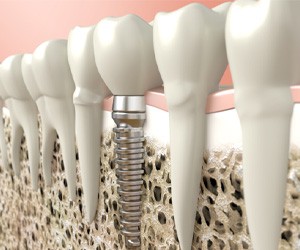Dental Implant Failure & Salvage – Plano
Save Your Dental Implant from Failure

Dental implants are an ideal way to replace missing teeth. They have all sorts of amazing benefits, including the fact that they have a success rate of over 95%! However, dental implant failure is still possible. If you notice something odd about your dental implant or you have any concerns, don’t hesitate to contact us . We may be able to restore your dental implants with dental implant salvage treatment.
Why Do Dental Implants Fail?

The most common cause of dental implant failure is peri-implantitis. This is when bacteria and infection destroy the connective tissue around the implant and weaken the supporting jawbone structure. Typically, this is caused by poor oral hygiene and gum disease. Other things that can cause a dental implant to fail include injury, failed osseointegration, and certain medical conditions, like uncontrolled diabetes.
Symptoms of a Failed Dental Implant

Dental implant failure doesn’t only happen when one first gets dental implants. It can happen several years down the line. Here are some of the signs that you should be on the lookout for:
- Pain and discomfort
- Gum recession around the implant
- Loose dental implant
- Difficulty chewing
- Gum inflammation
How Dental Implant Salvage Works

If you think that there could be something wrong with your dental implant, don’t hesitate to give us a call. We will examine your smile and discuss the symptoms you’ve been experiencing. Then, we can put together a treatment plan that is ideal for you. There are several different treatment methods that could be necessary. The most common ways we address dental implant failure are through deep cleanings, antibiotic treatment, and other infection control methods. The sooner we can address the issue, the more likely that we can save your dental implant.




